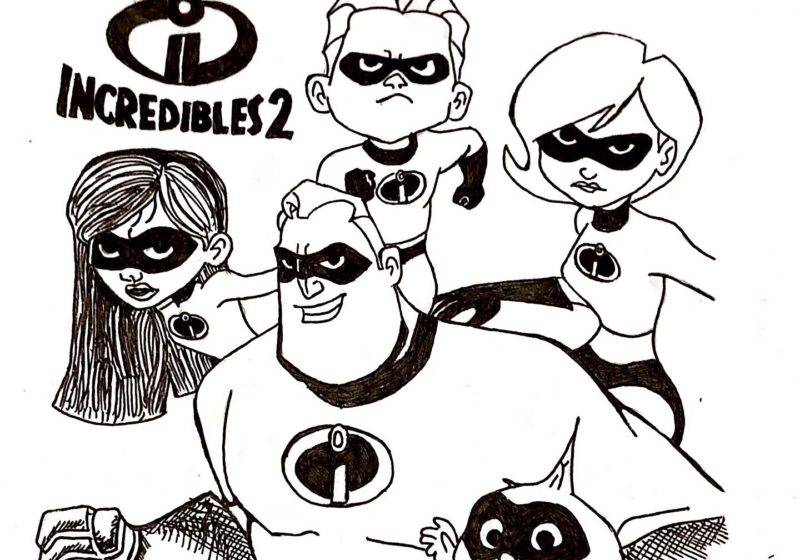The summer of 2018 contained many memorable movie releases. We picked a few favorites.
‘Incredibles 2’
Legendary animation director Brad Bird (“The Iron Giant,” “Ratatouille”) returned this summer with a triumphant sequel to the fantastic, fan-favorite film “The Incredibles.” Nearly everything that was so phenomenal about the original movie returns, from the mid-century settings to the expressive character designs to the surprisingly poignant, good for all-ages style of storytelling.
The cast outperformed all expectations. Standouts include Bird himself as the wonderful Edna, Samuel L. Jackson as Frozone, and Sarah Vowell as Violet. Violet, who was probably the least developed central character in the first film, completely comes into her own in the sequel.
The best attribute of the movie, however, is without a doubt Elastigirl (voiced by Holly Hunter), who returns from the 14-year hiatus as a complex, dynamic and unique protagonist without equal in any superhero flick.
‘Sorry To Bother You’
If you’re searching for something completely off the wall, to sweep you off your feet and re-contextualize everything you thought you knew about politics, the modern American way of life, and telemarketing, look no further than Boots Riley’s surreal “Sorry to Bother You.”
The film is entirely deliberate — after a hellish production cycle, Riley made sure to make every single detail on the screen at any given time count — and rife with clever visuals, constant shifts in tone, and fiercely satirical political commentary. Actors like the always-brilliant Tessa Thompson, and in particular Lakeith Stanfield, keep every scene fresh and fun.
Viewers will find themselves questioning how the film could get any weirder before being blown out of their seats for the umpteenth time as the offbeat comedy morphs into a nightmarish trip.
‘Blindspotting’
“Blindspotting” is a rich, nuanced meditation on gentrification, police violence, and issues of race and class. Director Carlos López Estrada’s entirely necessary feature-length debut is at times funny, touching, thrilling, and intense, helped by heartfelt performances from the film’s leads (and writers), Daveed Diggs (of “Hamilton” fame) and Rafael Casal.
At times, “Blindspotting” feels like a buddy cop movie about a duo of anything but cops. Diggs’character, the confused probation-server Collin, is wracked with both personal and cultural conflict that the audience can’t help but empathize with. Visually striking, with homages to popular television and films like Jordan Peele’s groundbreaking “Get Out,” “Blindspotting” is a must-watch for anyone concerned with any of the issues it raises, and anyone who just wants to see a quality, original movie.
‘Won’t You Be My Neighbor?’
I never watched Fred Rogers’ iconic children’s television show “Mister Rogers’ Neighborhood” as a kid. So the emotional bond that I felt after viewing the 94 minute documentary about Rogers and his program was all the more remarkable. The film posits that Mister Rogers’ mission was one of kindness, and that is exactly how the film approaches telling his story.
Approaching a story with kindness is easy when the story is about Rogers’ faith in the power of love in the development of children; approaching a story with kindness is more difficult when the story is about Rogers’ hand in keeping coworker François Clemmons closeted and encouraging his unhappy marriage to avoid scandal.
The movie tells the whole truth with empathy and fairness, never succumbing to fawning or playing the blame game. “Won’t You Be My Neighbor?” shows us how to confront fear and hate with love — even when one of love’s greatest icons could not.
‘Hereditary’
Many horror films operate on the fear of being hurt by a loved one. This pops up in “The Shining,” “The Exorcist,” and “The Babadook.” What sets “Hereditary” apart is that it uses the opposite fear, the fear of hurting those you love. “The Babadook” flirts with this fear, but doesn’t develop it to its full potential like “Hereditary.” The characters in “Hereditary” cannot stop hurting each other, and watching their struggle is terrifying.
Rather than limiting its empathy to the victims like most horror films, “Hereditary” empathizes with the victim and monster within each character. This means that we’re afraid of and for its characters at the same time. The product is both ghastly and deeply affecting. The movie is unflinching, and it gets ugly. But it’s a compassionate ugliness, one that affirms the humanist power of the movies.
‘First Reformed’
“First Reformed” affirms writer-director Paul Schrader’s status as one of the best articulators of anxiety in the business. Where Schrader once tackled a white male anxiety with “Taxi Driver,” he here tackles a Christian anxiety. The attitude that permeates the film’s perspective is that we (Christianity) had everything under control, but at some point, a mistake was made, and now we are headed in a terribly wrong direction. Now all we can do is wonder if God will forgive us, if he’s there at all.
“First Reformed” tells the story of an Albany pastor (Ethan Hawke) going through a mega-crisis of health, faith, and despair. Bleak, disturbing, and ultimately very rewarding, a slew of great performances and an engaging minimalist style have kept this film swimming around in my head months after I left the theater.




